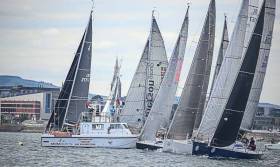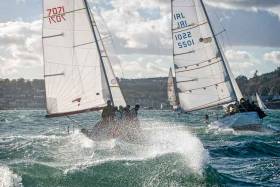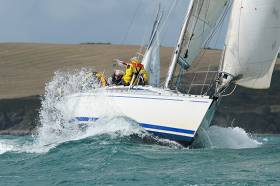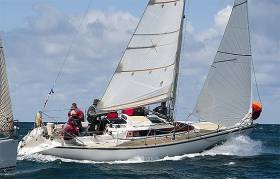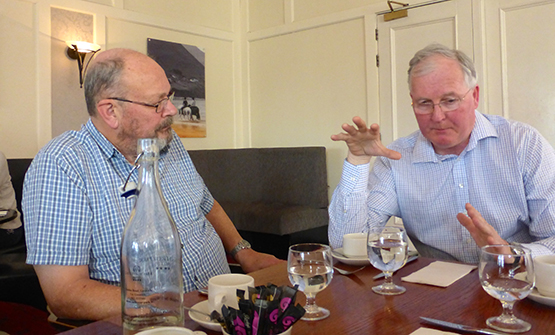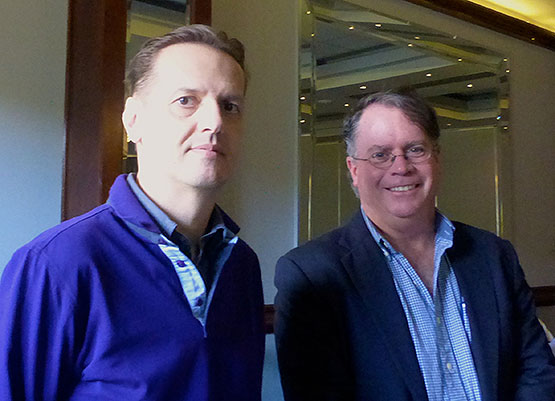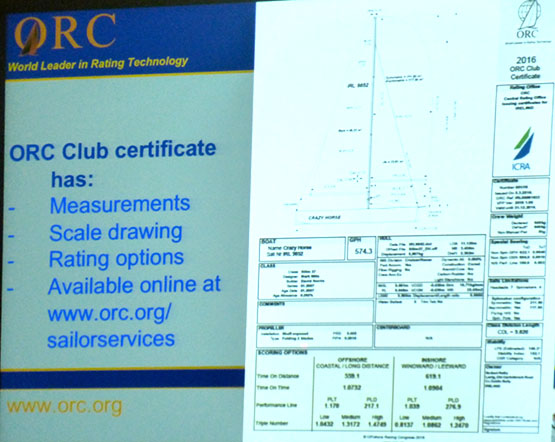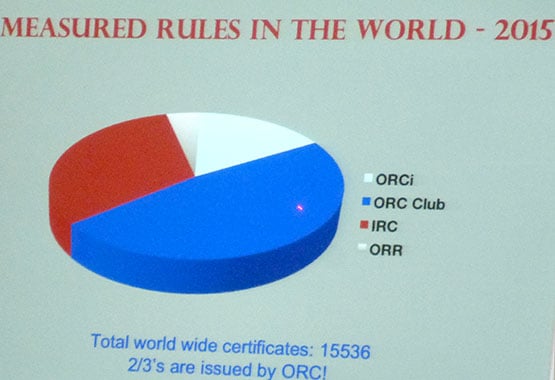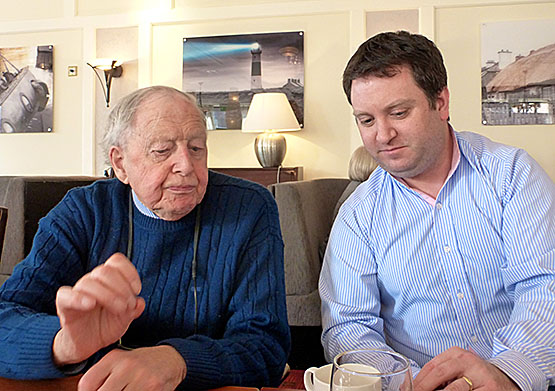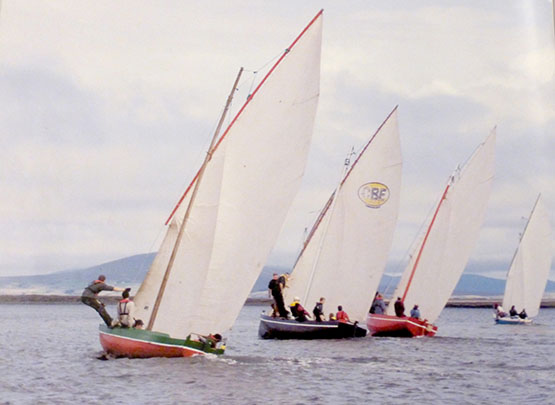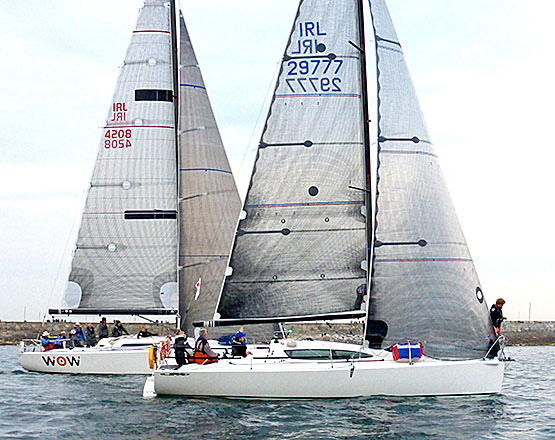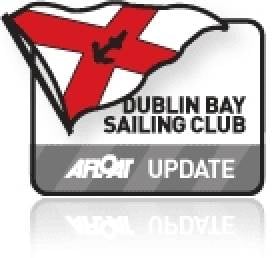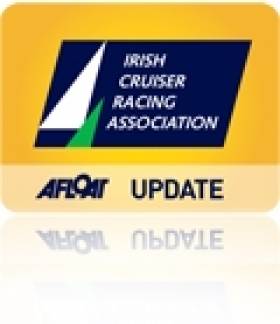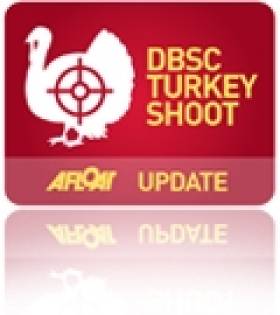Displaying items by tag: ECHO
Don't Mention Handicaps as IRC Changes Rules & Deletes Dayboats
The IRC Yearbook arrived in the post as I prepared to write this week’s Podcast. It is sent out together with your notice to renew your Handicap for the season ahead. Only, ‘oops’, the word ‘Handicap’ is no longer acceptable.
Peter Wykeham-Martin, Chairman of the IRC Congress, writes an editorial in the yearbook where he asks all IRC Certificate holders, or as it has been called for many years, a ‘Handicap’ to “please don’t use the word ‘handicap’ when talking about IRC.”
“Handicaps,” he says, “are what you bet on in horse racing and include a jockey’s form.”
“Rating,” Peter declares, “is what we use in IRC to assess a boat’s potential performance – the ability, or lack of ability of the helmsman and crew is not included.”
Is Chairman Wykeham-Martin writing with ‘tongue-in-cheek’ or is he having a ‘dig’ at ECHO ‘handicap’ system – Oops - there’s that word again?
He’ll have a bit of a job to eradicate the description ‘handicap’ from racing, but maybe the desire to do so is part of the changes which are announced in IRC in the very first page of the Yearbook. There are seven Rule Changes listed, plus ‘Definitions’ and other changes.
Amongst them the ‘default’ values for mainsail widths have been deleted, as this was considered inconsistent with the Rule on Headsails.
One of the more fundamental changes in the Rules is the deletion of the ‘Dayboat Definition and Rule 24.’ IRC and its predecessor CHS - remember that ‘handicap system’ –had defined a Dayboat as one which could not comply with Offshore Special Regulations and so Rule 24 stipulated a minimum self-righting angle and items that IRC-rated or ‘handicapped’ depending upon your regard for words and the Chairman’s view, should carry. In quite a few instances ‘Dayboat’ definition seemed to have a relevance to lifelines and, so could refer to boats from 1720s to J Class Yachts.
If you are an IRC holder, look it all up in the yearbook, but don’t mention the word ‘handicap’ if you want to ‘rate’ with the IRC afficionados!
Listen to the Podcast here.
ICRA Debate – Running The Rule Over IRC & ECHO Handicaps
The Irish Cruiser Racing Associaton (ICRA) has called for debate about the future direction of Irish cruiser–racing at Saturday's national conference in Limerick. Here, Brian Turvey makes his contribution by describing how IRC and ECHO rating systems work in Ireland and why there is concern over the availability of free handicapping software. The former Howth Yacht Club Commodore asks how ICRA can capture all cruiser-racing boats and add value to the sport because, he says, the future of cruiser-racing relies on ICRA starting to think more creatively.
Most racing sports appear relatively straightforward to the uninitiated and only reveal new layers of complexity as you become more involved and enthused to watch or participate. Consider Formula One racing, it seems straightforward - scream around the course faster than anyone else and you win. Horse racing in Britain now boasts that more than 60% of their sport is now categorised as handicapped, a departure from the principle of 'first past the post' by adding weights in a calculated effort to reinforce what is considered to be a sport of chance and potentially allow any horse and consequently any punter to win.
Then consider the sport of yacht racing, commonly recognised to be the most complicated sport to learn and there is little dispute that it is the most complicated of all to follow. Most sailors have attempted a well-intentioned explanation of the sport to a non-sailor, but very few are gifted with the skill to articulate it and fewer manage to retain the attention and interest of even the most fervent of enquirers.
But explaining the concept of yacht racing is only the first layer. Now add the much-used rating handicap systems. The goal of trying to narrow and equalise the finishing time of all competitors in a race is common to lots of sports and based on a measurement calculation, the first version was standardised in yacht racing during the 19th century. There have been many variants and evolution of the original formula and rule, with the dinghy-measurement version 'Portsmouth Yardstick' (PY) being the winner for longevity.
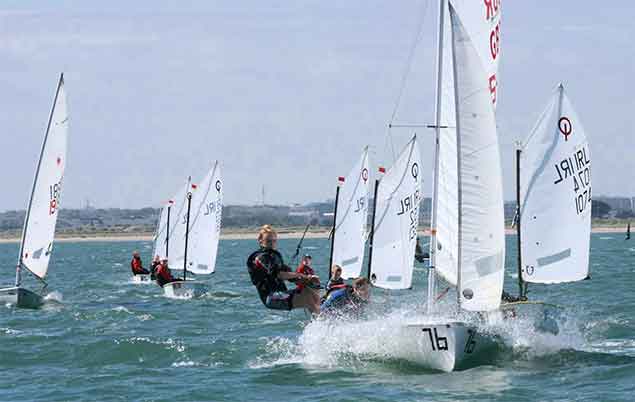 Mixed dinghies race under a Portsmouth Yardstick rule
Mixed dinghies race under a Portsmouth Yardstick rule
Endorsed by ICRA and the Irish Sailing Association (ISA), the system currently preferred by more than 7000 boats worldwide including most Irish and British yachts is the RORC's 'IRC Rating.' Closely monitored by yacht designers and engineer-types, it is essentially a formula that uses various boat measurements to calculate a rating number. When each rating is applied to every boat in a race and all other factors being equal, the factor-adjusted elapsed time should have every boat finish equal, or so the concept should work. And it does, for the most part. The theory and practice would be that those crews who best optimise their performance during the race, will win.
But as the designers get smarter and yesterday's yacht tumbles in value (unlike racehorse ownership, this is not a speculative investor's arena), the rule-masters in the RORC have to stay alert and agile to keep pace and keep relevant for their broad range of customers. However, they will always be 'followers', at best reacting a-season-too-late to those design enhancements that would otherwise render older racing designs obsolete much faster than their owners would stand for.
One-design sailors tend not to understand the attraction and complexity of IRC racing, by preferring to gravitate towards a class that offers localised 'critical mass' that might promise solid investment in relative terms and suggest many years sailing in a vibrant and competitive class. Which is all fine and dandy, but the leading edge of design development will more often be tested and refined in 'mixed-design' racing. Designers such as Mills and Corby revel in the challenge of one-off racing yachts, while the production-line manufacturers like Jeanneau and X-Yachts have to stay sharp with their designs, because producing anything less than competitively-rated racing boats from a production line would be calamitous.
So buying a well-rated IRC cruiser-racer is a bit like committing to the latest gadget, it will be out-performed in no time by the next best thing, albeit with some notable exceptions. What then for the enthusiastic racing owner of an older or lesser-rated design? Giving 5 minutes per hour to boats that frequently cross the line ahead of them will wear the enthusiasm for the sport from owner and crew in no time. There is a safety net and it is in the form of the next layer of complexity in cruiser-racing: Performance-Rated Handicapping.
Built under the guidance of the then ISA President Paddy O’Neill, ECHO (East Coast Handicap Organisation) was created by a team of Irish amateur sailors including Ernest Gouding, Hal Silk, Billy Lacy, Chris Bruen, Arthur Barker, John Deane and Chick Brown who all brilliantly blended their interest in sailing with their maths skills. The system has grown to be the main performance-based cruiser racing handicap system in Ireland and has in recent years been adopted and adapted internationally alongside measurement rating systems such as IRC and ORC.
With help from the Dublin Bay Sailing Club’s Brian Barry, it was integrated into a unique database-structured sailing results system built by Colin McMullen for DBSC and Howth Yacht Club. Colin had the distinction of being the only professional computer programmer in the world who was a sailor. ECHO, which was known in certain circles as as ‘Earnest, Chris Hal and Others’, is best compared to handicapping in horseracing, but by adjusting the elapsed time instead of saddlebag weight.
Calculated by and based on previous performance history, the formula calculates a rating for every boat that should have all boats finish on equal time. Whilst this desired end-point is similar to that of the measurement-based rating, it has a very different rationale. ECHO is designed to reward crews that out-perform their recent average results. The theory being that any boat can win, relative to their own performance history. The actual specification and design of boats is irrelevant and in theory, the slower and obsolete designs now have every chance of winning under ECHO. The ‘lower end’ of the fleet have something to race for, encouraging crew on the lesser competitive boats, eliminating the ‘what's the point’ factor, whilst maintaining and encouraging participation. Everyone's a winner, well perhaps not quite...
For ECHO to work optimally as per the concept, it relies on 'consistency' and all the possible variables need to be removed, or minimised at worst.
• The same boats and same number of boats must be continually racing against each other in each race. Every deviation in numbers competing and/or infrequent entries will alter all boats handicaps accordingly. This makes it at best very difficult, but normally impossible to assign initial handicaps to a mixed fleet of boats that haven’t recently nor regularly raced together. In these circumstances a ‘link’ boat is used where there is found to be a record of it racing against the other boats before, but it rarely works, because ECHO works best with local fleets.
• ECHO's focus is on the relative difference in performance of a boat (particularly the crew), so a change in personnel will often alter performance and therefore another variable is introduced. It should be noted that there is an obligation on boats racing under ECHO to declare substantive changes to crew, but in practice, most changes go 'under the radar' and rarely get declared.
• Any variation from the average/normal in weather conditions will affect the mean calculations. For example, lighter than average winds might favour the lighter displacement boats.
• Any alteration in the type of course (from the average) will introduce another variable. Different boat designs will vary in performance on specific up wind, downwind and reaching legs.
• There is also the issue of 'sandbagging' or deliberately underperforming in order to reduce ECHO rating and use this in the next or later race to advantage. This is very difficult to prove in competitive fleets, because a boat can lose places very easily and in genuine circumstances.
The ECHO administrators allow direct manual intervention to address anomalies such as these, but a results system that affords interpretive adjustments could be seen to be subjective and potentially ambiguous. Single race regattas are the most problematic, where new boats are added without previous integration in that fleet. Interestingly, it seems to work in the potentially controversial sport of horse racing without complaint.
ECHO is often erroneously compared to a golf handicap, but has little in common other than being performance-related. Golf handicaps are not derived from team performance, it is one person versus the course and the other competitors have neither influence on nor an ability to intentionally affect an opponent's score. Golf is not a race. Performance-rated yacht racing is almost always a team-sport, where with certain probability, every race will mean a change in performance by at least one boat, necessitating handicap revisions to all.
The step towards ‘progressive’ maintenance of ECHO handicaps was a welcome one for racing sailors that embrace the performance handicap, because it readjusts after every race. (ECHO used to only adjust periodically, often causing consternation in fleets by huge changes happening at one time.) However, as a consequence of this, it is almost impossible for an experienced and ECHO–savvy competitor to determine their actual standing during a race – what must it be like for the newbie or spectator? Whatever the difficulty with deducing the standings during an IRC race, performance handicap races are absolutely not spectator events.
But to be stressed out about the accuracies and anomalies of this system is futile. It will raise the passions of many a sailor, particularly when a calculation seems to produce an unfair result. Like measurement ratings, ECHO handicapping is not a pure science, but with the probability of so many variables, sailors need to know that it is always imperfect.
With the development of relatively simple sailing results software and the adoption of ECHO-type systems by sailing clubs and classes across the world, it is now possible to use this software for most sailing events and club racing. Lots of one-design classes have effortlessly added performance handicap prizes to their traditional ‘scratch’ races and events. Club volunteers who are using software packages such as Sail 100, SailWave and Top Yacht can now set up performance handicapping for dinghies, one-design keelboats and for cruiser racing in addition to providing results for Scratch, PY and IRC. This is now an attractive proposition for many clubs, because performance handicapping works best for local fleets where the same boats and sailors race together frequently.
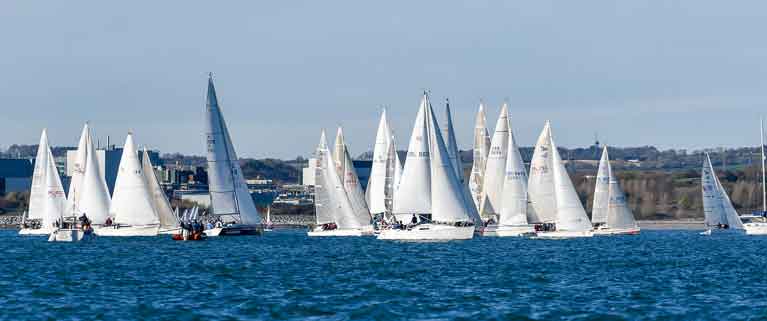 A wide range of different cruiser and sportboat types combine for all-in club racing. Photo: Bob Bateman
A wide range of different cruiser and sportboat types combine for all-in club racing. Photo: Bob Bateman
So how might this affect the future for ECHO in Ireland? The ‘elephant in the room’ and big consideration for the ISA and ICRA is that ECHO-type software programmes are now freely available and ideal for local club racing. Why then might a regional club or class need to use or pay for ECHO? It will naturally be conditional that the major regattas such as Volvo Dun Laoghaire and the ICRA Nationals insist on IRC and ECHO affiliation, but what for the local regattas when dinghies, powerboats and all sorts can use this software freely?
The current handicap registration process for cruiser racers in Ireland sees ICRA ‘pass the ball’ to the Irish Sailing Association to oversee the administration of IRC, ECHO and consequently the management of ICRA membership. With over 450 registered ‘member’ boats, ICRA really needs to take control of its own destiny. Their funding comes from an agreement with the ISA, who return a ‘slice’ of the revenues collected for racing certs (IRC and ECHO), after an administrative fee is deducted. A recent straw poll of the racing classes in Ireland would suggest that the average annual subscription for the various keelboat classes wanders between €50 and €100. One might imagine that a class that boasts about having thousands of participants should at the very least be able to raise €50-€100,000 of its own funds each year. But if there is danger in tagging their subscriptions through the ISA to an ECHO system that could now freely transfer to clubs and classes, and an IRC certification system that is already wary of international trends and new local interest towards ORC, then it’s time to think more creatively.
How might ICRA capture all cruiser-racing boats and add value where the ‘what’s-the-pointers’ need to be encouraged to participate in a national racing organisation? For instance, it’s possible that moves towards the national licensing and registering of vessels could provide an opportunistic inlet, although it would mean that the ISA would need to partly relinquish what would be its national governance – perhaps unlikely.
Taking control of a database-built results system might also afford ICRA (and other classes) to take responsibility for their members and racing administration – it would certainly help with sharing of performance handicap data and add value for clubs, classes and sailors. However, it has been suggested that the set-up cost would be prohibitive.
To survive as an organisation, ICRA must be an organisation – taking control of its own finances and of its own management of the Association.
The ICRA National Conference is being held in Castletroy, Limerick on Saturday and is themed ‘We must talk about cruiser racing’ and it’s certain that there will be lots of lively talk.
Brian Turvey
Kinsale Sailing Cruisers Turnout for 'At Home' Regatta (PHOTO GALLERY)
There was a great turnout for Kinsale Yacht Club's 'At Home' Regatta yesterday. The all–in IRC 2016 cruiser fleet attracted 19 entries and was won by Richard Hanley's GK24 Saoirse. In a 41–boat ECHO handicap division the win went to an Elan 333, Artful Dodger, skippered by Finbarr O'Regan.
The main feature of this year's 'At Home' was the upsurge of new Oppie sailors who started sailing at KYC this season. Unfortunately, KYC’s sailability fleet was stood down due to a heavy airs forecast although some sailors later went to sea in a Hawk 20. During the day a large squall with rain went through and this put a lot of the beginner Oppy sailors out of action. KYC is suffering a shortage of cruiser racers, like many other clubs, and this was evident in the spinnaker class turnout. The Squibs mustered four boats but one retired before racing.The Irish Cruiser-Racer Association (ICRA) is a unique organisation. “Run by sailors for sailors”, it is nevertheless a very land-centric administrative body whose only manifestation afloat as a group with its own identity is seen at the organisation of the annual ICRA Nationals. And the sense of it relating purely to the island of Ireland is accentuated by the fact that much of its work is essentially back-office activity, dealing with handicaps and all the other paraphernalia involved in providing the nation’s numerous and very diverse cruiser-racer fleet with meaningful racing. W M Nixon went to last Saturday’s ICRA Conference to get a flavour of what ICRA does, and came away both impressed and stimulated.
Sweeping along southwestward towards Limerick on our wonderful motorway system, while one’s body stays firmly on the dual carriageway, the mind can wander into any pathways it wishes. So we got to thinking that, in this age of increasing numbers of administrators trained to third level degrees in the running of not-for-profit organisations, it’s a bit odd to find a very successfully central organisation which is apparently run – and well run at that - on a Corinthian basis “by sailors for sailors”.
Surely in today’s climate, which favours key bodies such as this being run by highly-trained specialists on at least a semi-professional basis, a seemingly amorphous organisation which is “run by sailors for sailors” is verging on a clear case of the asylum being taken over by the lunatics?
We’d soon see. Meanwhile, why on earth hold an annual conference in Limerick? With Ireland’s population distribution changing so rapidly, skewing both towards the large urban centres and particularly towards the east coast and Dublin, surely anyone organising a national conference would find it attendee-friendly to look at the latest map of population weighting. As it happens, I’m not sure that such a map exists, but we’d like to think that with today’s computers it is possible to construct a map where, after due calculation, you could pinpoint to the exact centre of Ireland’s total population distribution.
So you set out heading for Limerick at an unfeasibly early hour thinking that maybe a central location such as pretty Portlaoise or tidy Trim would probably be Ireland’s central point in relation to population distribution. But after some smooth time on the road with the sense of the wonderful west coast coming ever nearer, you begin to wonder why ICRA didn’t make a proper job of it, and take us to Dingle where we can breathe that wonderful Atlantic air and think great thoughts of sailing the high seas.
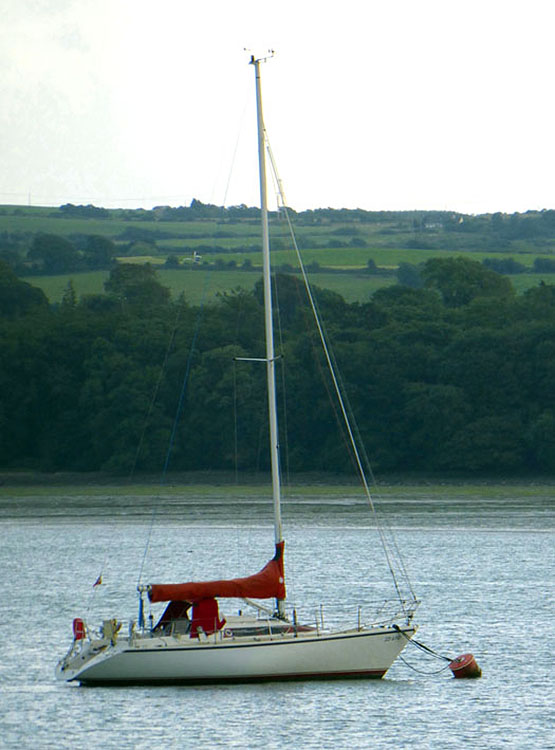
Far from the pressures of the cities of the east and south coasts, Dis-a-Ray is moored in the peaceful surroundings of Tarbert, where the south shore of the Shannon Estuary has already become part of the Kingdom of Kerry. Photo: W M Nixon
As it is, though the Dubs may think of Limerick as being on the western seaboard, it’s actually remarkably central when you draw lines across Ireland between all the best sailing locations. And as we knew that the position of Commodore of ICRA was going to pass on Saturday from Nobby Reilly of Howth (the Dingle of the East Coast) to Simon McGibney, Limerick was just about spot on in terms of equal travel time. For although the new Commodore has Foynes YC on the Shannon Estuary as his home club, his Dehler 101 Dis-a-ray is actually moored at his home at Tarbert which is further west down the Estuary, so much so that Tarbert is in the Kingdom of Kerry.
We arrived in to find a virtually full house distributed around a room-circling table such as they use for international diplomatic conferences to make peace with rogue states, with the layout being planned so that everyone can be an equal participant. It was grand for those of us who had arrived in the nick of time to get a seat, as we’d the fully-equipped table in front of us (did anybody else find it the devil’s own job to open the rather good but tightly-wrapped little sucky sweets which are essential to a talking shop?), but being Ireland several people arrived late, the show was already on the road, and they’d to find a seat as best they could.
All of which meant that there was a bigger turnout than expected, which is good news for ICRA. And for those of us comfortably ensconced, it made for a fascinating throughput of information by a long list of speakers, even though the layout meant that networking was restricted to the one hour lunch break if - like many people - you were relying on the 3.30-3.45pm wrap-up to facilitate returning to Dublin or Cork or wherever for a completely different event that night.
From the beginning, the dominant theme was on how we get more people into sailing, and everyone blithely talked as though we’re offering Joe Public a warm and sunny Croatian sailing product right here in Ireland, cheerfully ignoring the fact the last two summers have been plain lousy in terms of good weather.
Certainly the sailing was great for the enthusiast, but can you imagine a newcomer to the rough and ready sailing world wondering where on earth the attraction of it all was to be found as they were blown and bashed around at what we thought of as the utterly wonderful ICRA Nationals at Kinsale in June, or took in the all-too-typical variety of Irish summer weather at the hugely successful Volvo Dun Laoghaire Regatta in Dublin Bay in July?
Yet there is a fresh demand out there, and two of the morning’s speakers, Alistair Rumball of the Irish National Sailing School in Dun Laoghaire and Des McWilliam of McWilliam Sailmakers in Crosshaven, gave excellent talks on encouraging it, with Alistair showing us how his programme of moving beginners through dinghies and on into the school/club’s1720s, then became an inevitable progression into gaining experience and instruction on the school’s Prima 38 Lynx.
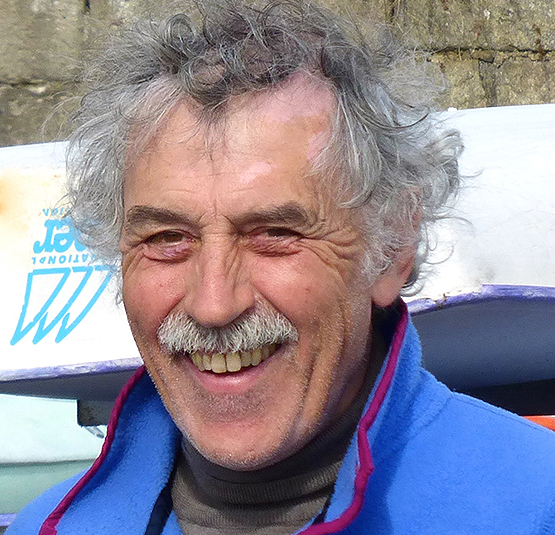 The mover and shaker. Alistair Rumball’s Irish National Sailing School in Dun Laoghaire is first port of call for many newcomers to sailing. Photo: W M Nixon
The mover and shaker. Alistair Rumball’s Irish National Sailing School in Dun Laoghaire is first port of call for many newcomers to sailing. Photo: W M Nixon
“Lynx has been a greater success than we could have ever dreamed of” he said. “She has been so booked out with people keen to learn about sailing a cruiser-racer that we haven’t been able to get as much actual racing with ISORA and so forth as we’d like. But for 2016, she’s being taken out of our Dun Laoghaire setup for long enough to be organised for a proper shot at the Volvo Round Ireland”.
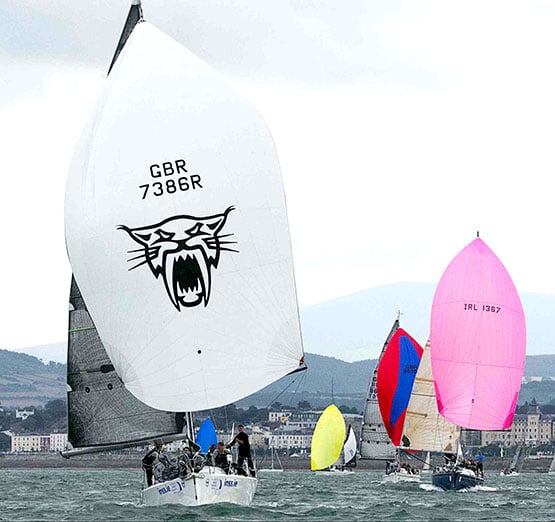
The double life of a Prima 38. The INSS’s Lynx in full racing mode in Dublin Bay (above), while below she is seen in early training mode as she takes a crew of beginners in cruiser-racing out for some formative experiences
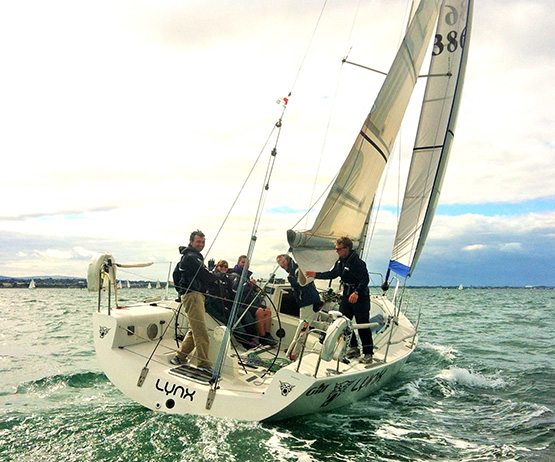
As of last weekend in Limerick, there were just two crew places left aboard Lynx for this year’s Volvo Round Ireland on June 18th, and they’ve probably been snapped up by now. But the Rumball presentation underlined the fact that there are people out there who are mad keen to get into cruiser-racing, and it was up to ICRA to guide its members as to how best to tap into these wannabee sailors, instead of bleating all the time about how hard it is to find crew.
Des McWilliam leapt into the same theme, and gave us a crash course in how to make crewing on your boat more attractive to strangers. Admittedly the experience of seven years of acute economic recession have understandably made those who have kept boats in racing commission more than a little stressed. But if they want to reap the benefits of having struggled to stay in the boat-owning stream, then they have to make their cruiser-racers pleasanter to sail on, and more effective racing machines.
The McWilliam message was blunt in the extreme. “As a sailmaker in Ireland, each year I will race actively at many venues on upwards of 40 boats, both evenings and weekends. I will experience many different management and sailing styles. At the end of the year looking back, I usually realise that there might be only ten to a dozen boats out of that total of forty to which I would gladly and freely return for the good sport, the efficient sailing, the successful racing, the camaraderie – the fun. The rest of them are just work, involving duty visits. Please remember this when you are setting up the running of your boat, and trying to encourage people to sail with you.”
Des McWilliam of Crosshaven and Rory Staunton of Mayo. Des provided the meeting with some telling home truths about how attractive (or not) cruiser-racers throughout Ireland can be to sail on, while Rory Staunton led the charge in wondering why ORC and IRC cannot be amalgamated, and then went on to outline a new trailerable 33-footer he and an international group of friends are developing to make the incomparable west of Ireland a more accessible sailing area
We earned our lunch by going through an intensive session with Dobbs Davis of the Offshore Racing Congress, who had come to the conference with Zoran Grubisa to promote their measurement rule, which is used worldwide anywhere that IRC is not dominant, and in some key events such as the Rolex Sydney-Hobart Race, they are used in tandem, though IRC is currently the more-used system in that classic event.
It says everything about how Irish sailing punches way above its weight that these two guys thought it worth their while to come among us and evangelise for their system in a country which has a more-than-friendly relationship with the IRC and the people who run it. But it was fascinating stuff, making an input which added real spice to the day.
Davis is Chairman of the ORC’s Promotion & Development Committee, while Grubisa heads the Rating Officers Committee, and they run a system which is now the ISAF-approved rating method for the ISAF Offshore Worlds, which this year will be staged in Copenhagen in July, which as it happens is more or less the same time as the Royal Cork YC will be staging the new European IRC Championship in Volvo Cork Week at Crosshaven.
So the presence of the evangelists from the ORC at the ICRA conference could have opened up a right can of worms, but fair play to Dobbs Davis, he gave such an enthusiastic and lucid explanation of the completely transparent way in which ORC function that, for the time being at least, one’s instinctive loyalty to IRC was suspended out of intellectual curiosity.
Leading Offshore Racing Congress officers Zoran Grubisa (left) and Dobbs Davis were in Limerick to evangelise for the ORC Rating system
While IRC still has one or two hidden elements – the “Black Box” factor – with the transparency of ORC, you can always see how different inputs are effecting the final figure. One-design sailors may find all this utterly yawn-making, but as Davis pointed out, although there are so many successful cruiser-racer One-Design classes in America that ORC has yet to gain significant traction there despite being first set up in the US forty years ago, elsewhere in the world more and more people are coming to ORC as they enjoy watching boat innovation and performance analysis interacting to make their sailing more interesting and the results indicative of pure sailing ability.
The approachability of the ORC system was presented as one of its advantages
The slice of the cake worldwide for the different rating systems
But as we all know, where IRC and OCR are run side-by-side, despite the IRC’s hidden elements the two outcomes are often very similar. And in Ireland where we have a soft spot for the old S&3 34s which set world alight in 1969-73, the fact that the veteran though beautifully restored S&S 34 Quikpoint Azzura was overall winner of the Rolex-Sydney Hobart Race under OCR, after so nearly doing it on IRC, caused a bit of heart-searching. But nevertheless Rory Staunton from Mayo SC spoke for many when he demanded to know why IRC and ORC couldn’t get together and resolve their small differences for the general benefit of the offshore racing fraternity. Dobbs Davis said his door was always open, but that began to feel a bit too reminiscent of the current efforts to form a government, so we were glad enough to take a break for lunch and then return to the rating topic, but from an entirely different point of view
The inevitable expense in maximizing your boat’s performance potential under either IRC or ORC made the sheer economy of ICRA’s Progressive ECHO system seem immediately attractive, and the lead-in the afternoon session by SCORA Commodore Ronan Enright even more apposite. Because the fact is, you could run the Progressive ECHO Handicap System without even knowing what a boat looks like, let alone having her dimensions measured do the last millimtre.
Donal O’Sullivan of Dublin Bay SC, and Ronan Enright, Commodore SCORA, discussing sailing administration matters during the lunch break at Limerick. Enright went on to give an illuminating presentation about developments in Progressive ECHO Photo: W M Nixon
In the absence of ICRA’s ECHO supremo Denis Kiely - unavoidably absent for family reasons – Ronan Enright gave a quietly telling performance. It’s fascinating that though ECHO started life as the East Coast Handicap Organisation back around 1971-72, it’s now a nationwide service overseen by ICRA, and its most active area of development is in the cauldron of concentrated cruiser-racing which you find when the activities of Cork Habour and Kinsale are combined.
Basically, Progressive ECHO depends on the results of the most recent race, after which, if certain criteria have been fulfilled, the results are automatically re-computed to give boats a new rating based the supposition that they had all finished dead level on handicapped time. My own most recent experience of racing with it when it is being enthusiastically applied was in the Volvo Dun Laoghaire Regatta, which was a perfect test-bed for the system, as it was a compact series with the same fleet throughout.
The result is a series-long level of commitment by boats and crews who, under a more brutal system, would have seen their interest and enthusiasm flag after Day Two or even earlier. So really the message is: If we’re trying to get people to enjoy sailing and particularly to enjoy racing which is what the non-involved most easily comprehend, then Progressive ECHO is doing more to get bums on boats than anything else in Irish sailing, for believe me you have never seen anything quite so heart-warming as the response of a crew who, under One-Design or fixed handicap systems, had not been at the races at all, yet suddenly under Progressive ECHO they find they’ve recorded a win.
Which was all good news but perhaps the most interesting revelation of all from Ronan Enright was that the top IRC racers around Cork are now taking a closer interest in their Progressive ECHO showing than there are in their IRC results. For under IRC, they know they’ll be in the top six, but each post-race adjustment of Progressive ECHO gives them a very clear message about just how well or not they were really doing on the day.
Tom MacSweeney of this parish then hosted a forum which basically came down to how sailing can present a more friendly and accessible response to people who might be vaguely interested, and could be potential sailing enthusiasts. This involved him drawing on his training as a critical journalist, for as he admitted, when he first turned up with his first sailing boat – a Ruffian 23 – in Crosshaven, everyone from Denis Doyle downwards immediately made him welcome. But we can all think of non-assertive characters who are great sailors, yet if they hadn’t been in sailing families in the first place, they might not have taken up the sport at all owing to the sometime apparently closed nature of “yachting”.
We learned that very little of an Achill yawl is showing above the water after she capsizes. This is how they look in proper order
Allied to Des McWilliam’s incisive look at boats which you like to be aboard, and boats which you definitely don’t, and it all provided food for thought, as too did John Leech of Irish Water Safety with his no-nonsense presentation about a mature approach both to safety, and to being rescued. In an interesting mix of images, he showed us a photo of what happens to an Achill yawl when it capsizes. The result is an awful lot of rather waterlogged traditional boat under the surface, and only a little bit showing with the crew perched on top. As Des McWilliam was probably the only other person present with any idea of what an Schill yawl in full health looks like, the least we can do here is show you a photo of them in good sailing order. Meanwhile, John Leech concluded by saying that when you call out the ASR helicopters, think rather of how you can prevent your mast – if it’s still standing – from interfering with the rescue. Don’t for heaven’s sake use up emotional energy thinking about how much it all costs. They’re on standby all the time, and you the taxpayer have paid for them in the first place.
We concluded with Rory Staunton seeking interest and opinions for the new 33ft trailerable One-Design. While we all hope to get down to Clew Bay to sail the prototype this summer, could I suggest that one of the most exciting projects on the Irish cruiser-racer horizon is WIORA Week 2017 in the Aran Islands. So when they’ve finally got around to fixing a date, maybe the promoters of the new 33-footers could arrange to have a flotilla of them in Kilronan in 2017 to give the class a rocket-assisted launching.
Meanwhile this year’s WIORA West Coast Championship is under the auspices of the Royal Western of Ireland Yacht Club at Kilrush from June 29th to July 2nd. There’s so much extraordinary history in being able to write that simple bit of information that I reckon we’ll have to give it a complete blog in the future.
As for the ICRA Nationals, they’re at Howth from June 10th to 12th with both IRC and Progressive ECHO being used, while Volvo Cork Week comes up in July after the Volvo Round Ireland race has been tidied away in late June.
Although last Saturday’s Limerick gathering was essentially a wide-ranging conference, it was also the changeover to the new Commodore, with Simon McGibney taking on the mantle from the energetic and enthusiastic Nobby Reilly whose own boat, the Mills 36 Crazy Horse, was seen in virtually every event, and looked like heading for the win in Class at the ICRA Nats in Kinsale last June until new big winds swept George Sisk’s WOW to the fore. During Nobby’s busy time in the top office, ICRA’s activities and its reach steadily expand, while thanks to the persuasive efforts of Anthony O’Leary, a Commodore’s Cup team was assembled which regained the trophy in 2014.
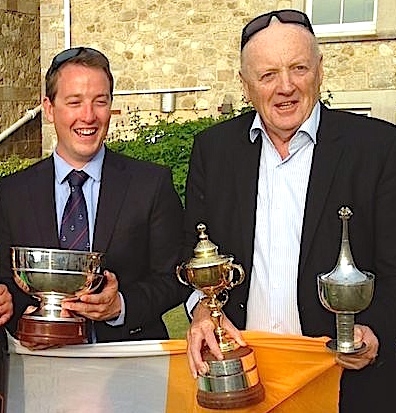 Ross MacDonald and ICRA Commodore Nobby Reilly at the Royal Yacht Squadron in Cowes in July 2014 after Ireland had won the Commodore’s Cup. At the ICRA Conference in Limerick last weekend, McDonald won a special award for his season’s results in 2015 with his X332 Equinox, while Nobby Reilly stood down after his successful years as Commodore, handing over the helm to Simon McGibney.
Ross MacDonald and ICRA Commodore Nobby Reilly at the Royal Yacht Squadron in Cowes in July 2014 after Ireland had won the Commodore’s Cup. At the ICRA Conference in Limerick last weekend, McDonald won a special award for his season’s results in 2015 with his X332 Equinox, while Nobby Reilly stood down after his successful years as Commodore, handing over the helm to Simon McGibney.
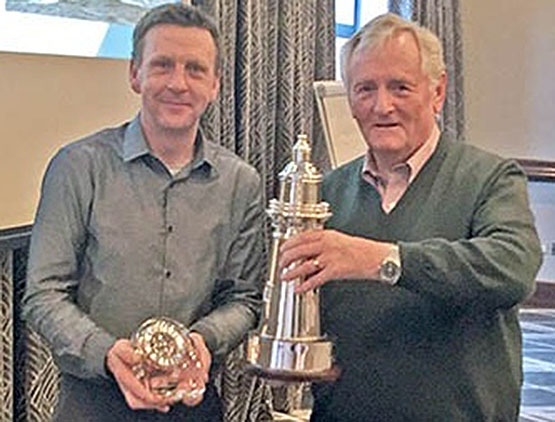
New ICRA Commodore Simom McGibney presents the “Boat of the Year” trophy to George Sisk of the Royal Irish Yacht Club, skipper of the Farr 42 WOW.
Work is going on behind the scenes to provide a strong defence this summer, but Anthony O’Leary wasn’t in Limerick to tell us about it, as he was away on his annual participation in America in the Viper 640 Championship, which just wouldn’t be the same if O’Leary wasn’t taking part - so much so that last year, he wasn’t present when his name came up as “Sailor of the Year” in Dublin, for he was away then too, Viper racing in the sun.
But other top sailors were there to round out the conference with the annual awards such as special performances by the likes of Dave Cullen with Checkmate XV and Ross Macdonald with Equinox and, while the ICRA Boat of the Year presentation, with warm acclamation, went to George Sisk of WOW, who not only admitted that his well-tested craft usually races with a crew of average age 53, but if he himself didn’t happen to be on board, the average age came down considerably………..And in case you think becoming ICRA Boat of the Year is all about glamour racing in sunshine, we close with a photo of WOW and the JPK 950 Alchimiste crawling towards the starting line for the Dun Laoghaire to Dingke race on the sort of damply windless evening that most folk would much prefer to spend comfortably at home.
It isn’t always glamour and warm sunshine and pleasant breezes. 2015 ICRA Boat of the Year WOW on a damp and windless evening approaching the start of the 280-mile Dun Laoghaire to Dingle race with the JPK 960 Alchimiste.
Yacht Handicap Fees Increase for 2016
Yacht handicapping fees will rise by 12.5% for the coming season.
An average sized boat, such as a Sigma 33, will now have total handicapping costs of €177 in 2016 as opposed to €162 in 2015. This breaksdown as follows: ECHO registration is €42. IRC online registration is €13.50 per metre, an increase of €1.50 per metre (12.5%)
The Irish Sailing Association (ISA) is the administrator for both the local ECHO and international IRC handicap systems. IRC certs are processed for the ISA by the London based Royal Ocean Racing Club (RORC) who govern the IRC rule.
The ISA's CEO Harry Hermon says IRC fees are set in € for Irish boats at the beginning of each year. 'The IRC fee structure sent out with the renewals in January 2016 and showed a 12% increase which is due to the sterling exchange rates. There are no changes to the ECHO fees for 2016. Handicap fees will not be reviewed again until 2017'
Ireland has a national cruiser racer fleet estimated between 500–700 boats.
Meanwhile, handicaps will be a focus at the 2016 ICRA conference when it gets underway at the Castletroy Hotel in Lmerick on Saturday, March 5th.
The pow–wow will receive a presentation from the promoters of the ORC handicapping system that is gaining popularity as an alternative to IRC. Florida's recent Key West Regatta in Florida was split between the two systems.
Speaking to the Irish Times last Friday, former ICRA commodore Norbert Reilly said: “We have no idea what ORC is but would like to know and especially why it is making so much progress overseas.
ICRA also plan a review of the ECHO system for 2016.
#dbsc – BENETEAU 31.7 Echo- 1. Prospect (Chris Johnston), 2. Levante (M.Leahy/J.Power), 3. Extreme Reality (P.McSwiney/E.O'Rafferty)
BENETEAU 31.7 - 1. Prospect (Chris Johnston), 2. Levana (Jean Mitton), 3. Crazy Horse (F Heath & I Schuster)
CRUISERS 0 Echo - 1. Tsunami (Vincent Farrell), 2. Aurelia (Chris Power Smith), 3. Wow (George Sisk)
CRUISERS 0 - 1. Tsunami (Vincent Farrell), 2. Wow (George Sisk), 3. Aurelia (Chris Power Smith)
CRUISERS 1 - 1. Ruth (L Shanahan), 2. Jalapeno (P Barrington et al), 3. Something Else (J.Hall et al)
CRUISERS 1 Echo - 1. Ruth (L Shanahan), 2. Jalapeno (P Barrington et al), 3. Something Else (J.Hall et al)
CRUISERS 2 Echo - 1. Jester (Declan Curtin), 2. Antix (D Ryan), 3. Peridot (Jim McCann et al)
CRUISERS 2 - 1. Jester (Declan Curtin), 2. Peridot (Jim McCann et al), 3. Jambiya (Ryan & Lattimore)
CRUISERS 3 A Echo - 1. Hard on Port (F O'Driscoll), 2. Quest (B Cunningham), 3. Cries of Passion (B Maguire)
CRUISERS 3 A - 1. Quest (B Cunningham), 2. Hard on Port (F O'Driscoll), 3. Cries of Passion (B Maguire)
CRUISERS 3 B - 1. Asterix (Counihan/Meredith/Bushell), 2. Cacciatore (M Ni Cheallachain), 3. Taiscealai (B Richardson)
CRUISERS 3 B Echo - 1. Jiminy Cricket (M Tyndall), 2. Small Wonder (H Kelly), 3. Saki (Paget McCormack et al)
Combined Classes Echo - 1. White Mischief (Timothy Goodbody), 2. Rupert (R & P Lovegrove), 3. Jester (Declan Curtin)
Combined Classes - 1. White Mischief (Timothy Goodbody), 2. Rupert (R & P Lovegrove), 3. Jester (Declan Curtin)
DRAGON - 1. Diva (R.Johnson/R.Goodbody), 2. Phantom (D.Williams), 3. Zinzan (Daniel O'Connor et al)
FLYING FIFTEEN - 1. Ignis Caput (David Mulvey), 2. Betty (D & S Gorman), 3. Fflogger (Alan Dooley)
GLEN - 1. Glenmiller (P Cusack), 2. Glenmarissa (F.Elmes), 3. Glendun (B.Denham et al)
RUFFIAN 23 - 1. Shannagh (S.Gill/P.MacDiarmada), 2. Diane ll (A Claffey/C Helme), 3. Bandit (Kirwan/Cullen/Brown)
SB20 - 1. Venuesworld.com (Ger Dempsey), 2. Sin Bin (Michael O'Connor)
SHIPMAN - 1. Jo Slim (J.Clarke et al), 2. Euphanzel lll (M Muldoon), 3. Gusto (Heath, Miles, Crisp, Duggan)
SIGMA 33 - 1. White Mischief (Timothy Goodbody), 2. Rupert (R & P Lovegrove), 3. Leeuwin (H&C Leonard & B Kerr)
SIGMA 33 - 1. White Mischief (Timothy Goodbody), 2. Rupert (R & P Lovegrove), 3. Popje (Ted McCourt)
SQUIB - 1. Perfection (Jill Fleming), 2. Sidewinder (R&R Westrup), 3. Femme Fatale (V Delaney)
WHITE SAIL CRUISERS Echo - 1. More Mischief (Eamonn Doyle), 2. White Lotus (Paul Tully), 3. Just Jasmin (Philip Smith)
WHITE SAIL CRUISERS - 1. Persistence (C. Broadhead et al), 2. White Lotus (Paul Tully), 3. Act Two (Michael O'Leary et al)
Foynes YC to Host 2012 WIORA West Coast Championships
#WIORA– As a flagship event to mark their 50th year of sailing on the Shannon Estuary, Foynes Yacht Club are setting an aggressive target to attract 50 boats to next year’s West of Ireland Offshore Racing Association (WIORA) sailing championships to be held from the 11th to 14th of July. The WIORA poster is below.
Ed Conway and Raymond McGibney are flying the flag for Foynes having being recently re-elected to the WIORA committee for another year.
IRC, ECHO and White Sails classes will be raced and the club says a festival atmosphere ashore will be 'guaranteed with well-priced, quality catering and top class live entertainment' provided at the recently renovated clubhouse.
All boats entered will be given free and secure berthing. Free lift-in/lift-out of trailer sailors will also be arranged. Liam Dineen has been appointed OOD and already over forty boats have registered.
In addition to all Western clubs, Foynes will be canvassing sailors from the active racing fleet on Lough Derg to come by road or river to join in this celebration sailing event, last held in Foynes in 1998.
While standard “around the cans” windward-leeward courses will be laid for the IRC and Echo fleets, more varied courses for white sails will be set, taking yachts to all parts of the scenic estuary. A special section is currently being added to the club website to cover all aspects of the event.
More on The Estuary here
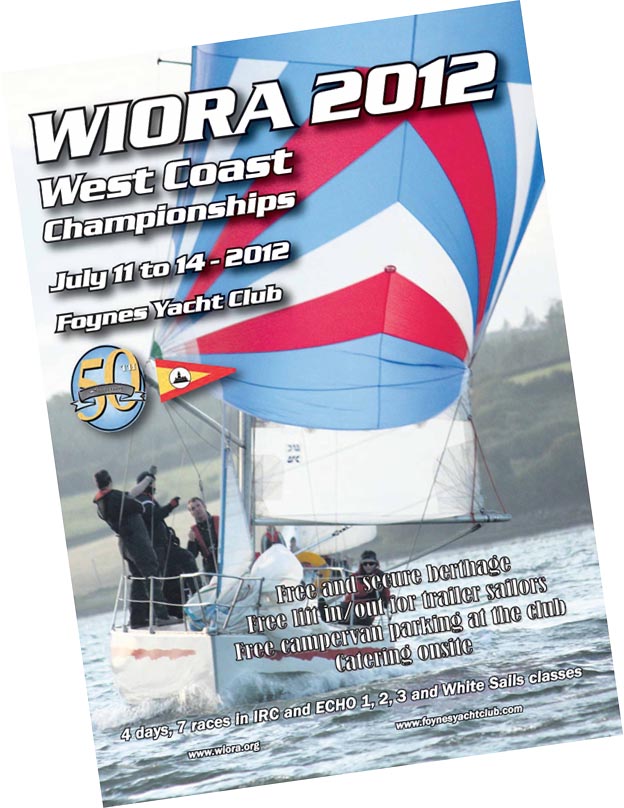
ICRA Launch Corinthian Cup
On Friday night last Barry Rose Commodore of the Irish Cruiser Racing Association launched the ICRA Corinthian Cup at the Royal Cork Yacht Club when Club Admiral Paddy McGlade was presented with the new trophy writes Claire Bateman. This cup will be the ultimate trophy for the non spinnaker fleet and carrying the same status of 'National Championship' at the ICRA National Championships. These events, to be sailed side by side, will give due recognition to both events and will add an element of fun and family competition to the whole scene.
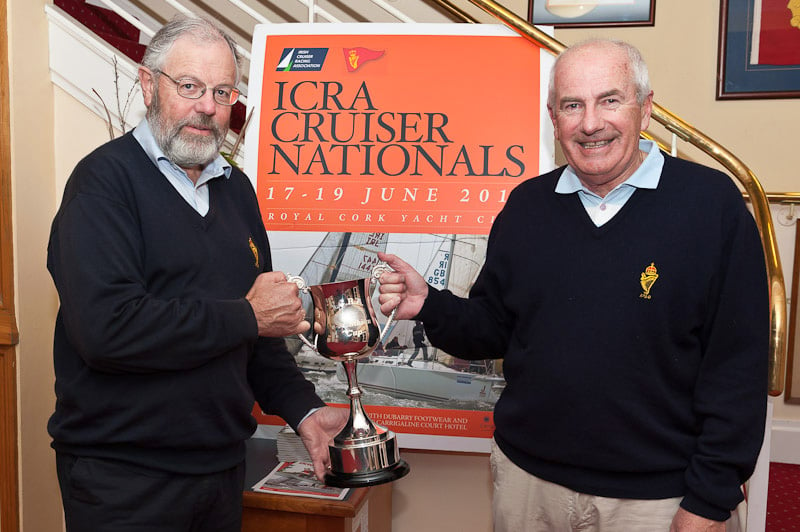
Royal Cork Admiral Paddy McGlade receives the new trophy from ICRA Commodore Barry Rose. Photo: Bob Bateman
It was felt by ICRA that the idea of a Corinthian Cup event would reflect the spirit of inclusiveness being displayed by the non spinnaker sailors and means there are now two identical Cups offering equal status to both ECHO and IRC champions.
Admiral Paddy Mc Glade has placed the trophy on display in the Club Bar to encourage all the local non spinnaker (whitesail) fleet to enter the event to be hosted by the Royal Cork Yacht Club from 17th to 19th June.
Douglas Deane will be Race Officer for the non-spinnaker class so an event of the highest calibre is assured.
SCORA Meet to Discuss the State of South Coast Sailing
The 2010 Annual General Meeting and Prizegiving of the South Coast Offshore Cruising Association (SCORA) will take place at Kinsale Yacht Club on Friday December 3rd at 8pm.
Hugh Mockler of HM Yachts will present the League prizes for the eighteen race series that included the Kinsale April league and the Royal Cork Autumn League.
Des Mc William of McWilliam One Sails will present the championship prizes for the series that was sailed in Cobh in September.
The SCORA Committee will present a series of sailing action photographs from the various events covered by Sailing Photographer Bob Bateman during the season.
The meeting will discuss the state of sailing on the South Coast and the ongoing development of the Echo progressive handicap system, together with the possible movement of class bands.
At the close of the sailing season an interesting evening is assured so all sailors are urged to attend and avail of the opportunity to air their views on the handicap system and the class bands.
Turkey Shoot Attracts 65 Entries on Dublin Bay
With 65 boats on the line last Sunday for the opening race of the Viking Marine Turkey Shoot there's little doubt about the appeal of year round sailing on Dublin Bay. In spite of this week's high winds last Sunday's opening race saw quite a few no finishers due to lack of wind. Handicaps have been adjusted as per the local rules that apply to the series for Sunday's second race. Arwen now goes in the second start and Windshift goes in the fourth start. Race officer Fintan Cairns says "Some boats will be suffering from nose-bleeds this week with the meteoric rise in their handicaps". The series is made possible through the support of Dublin Bay Sailing Club and sponsors Viking Marine, McWilliam One Sails, North Sails & O'Brien Press.
Last weeks results, Race handicaps and start details attached for download below.



























